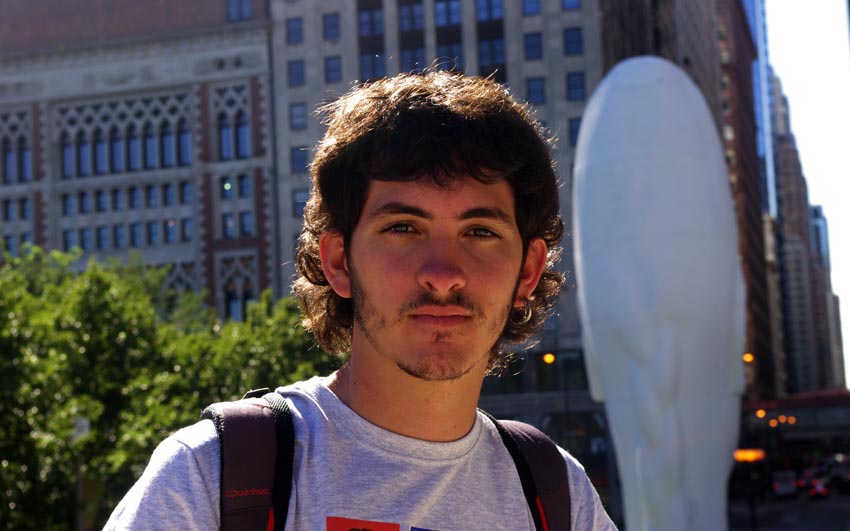Joseba Etxarri. He finished his degree in Modern Languages at the University of Deusto in June and in August he was on his way to Illinois State University, where he takes and teaches classes, in a deal that he is happy with, since “then I can afford to study and live in the US,” he explains. He got the position thanks to support and information that he received from a professor at Deusto, who encouraged him, along with other students in his position, to send applications and resumes to different American universities until he was accepted at one. He have been there for eight months and he is very happy. In fact he has started thinking that he could stay and do a Ph.D. in Illinois.
-It seems like a dream of many: live and experience another country and to continue advancing your studies, while teaching classes to pay for it.
I can’t complain. Along with others, I was lucky enough to get the guidance of a professor at Deusto, Jon Franko, who gave us information to send applications and resumes. He explained to us how to write them, detailing, for example what is most valued when accepting people. I had various possibilities and I chose Illinois State University because the university is good and it gave me the opportunity to teach. They pay me in dollars, and the monthly salary allows me to pay rent and just make it, and live without going broke. Since I teach classes, I also have a fee waiver so I don’t have to pay the full tuition for the Masters in Linguistics that I’m doing.
-Is this your first time in the United States?
Yes. I had been to Stockholm before with Erasmus. It was easy for me in English since I study linguistics with a specialization in English, so I only had to change my ear and get used to the accent, expressions and slang used in the US. Our university is the first public one in the state and there are about 20,000 students. There are many buildings, a stadium, a rec center for the students, pools and sports complexes, it is very different from universities from over there.
-What is it like teaching American students?
Really positive. At first I was kind of nervous, but I got used to it right away. They are students from various colleges that require a foreign language. Teaching here is very practical, it’s a communicative system and we talk a lot. I teach second year, and have about 20 students.
-How do you introduce yourself to them?
I tell them that I am Basque from a small corner of Europe that is between the north of Spain and Southern France and that we speak a language called Euskera. In general, they don’t know anything about us. Later, when we talk about cultural things, I introduce some Basque culture. For example, last week I put on a video of Korrika. We also watched Ocho apellidos vascos. They don’t know anything about Spain either, not even sevillanas or flamenco. They also don’t know that there are more languages spoken in the peninsula than Spanish. Their Spanish reference is mainly Latin America.
-In March you started a Basque club at the university.
To date, as far as I know, we are four Basques from over there here at the university, three students and a professor. Since I came in August, and throughout the first semester, I was thinking about it and sharing the idea of starting an association to share and introduce Euskera and the Basque culture. The idea was that the university could eventually include Basque among its classes, like they do with other languages. They just started, for example, Japanese and Portuguese classes. Why not Basque? We talked to the head of the department and for the moment it’s not a possibility but you first have to plant the seed. We had an open meeting that about a dozen people attended. That encouraged us and we sensed a clear interest.
-I think you have also organized a second meeting.
Yes, we baptized the association, Artaburu Basque Club and our second public meeting will take place in April, in a couple of weeks. It will include a pintxo workshop – gastronomic activities usually attract more people – and we will see if we do some local version of Korrika, at least a symbolic one. I would like to show the documentary Bidaia Intimoak by Jon Maya and we have asked the producer for permission but I’m waiting for his answer. It’s also possible that we will schedule our first Basque class before the end of the semester, not for credit, but to check the attendance, so we would continue next semester.






 Send to a friend
Send to a friend Add comment
Add comment








